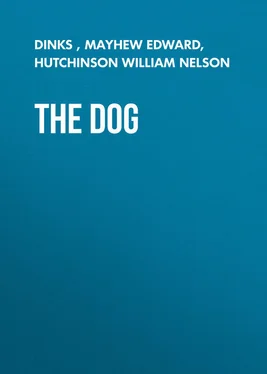Array Dinks - The Dog
Здесь есть возможность читать онлайн «Array Dinks - The Dog» — ознакомительный отрывок электронной книги совершенно бесплатно, а после прочтения отрывка купить полную версию. В некоторых случаях можно слушать аудио, скачать через торрент в формате fb2 и присутствует краткое содержание. Жанр: Домашние животные, foreign_antique, foreign_prose, на английском языке. Описание произведения, (предисловие) а так же отзывы посетителей доступны на портале библиотеки ЛибКат.
- Название:The Dog
- Автор:
- Жанр:
- Год:неизвестен
- ISBN:нет данных
- Рейтинг книги:5 / 5. Голосов: 1
-
Избранное:Добавить в избранное
- Отзывы:
-
Ваша оценка:
- 100
- 1
- 2
- 3
- 4
- 5
The Dog: краткое содержание, описание и аннотация
Предлагаем к чтению аннотацию, описание, краткое содержание или предисловие (зависит от того, что написал сам автор книги «The Dog»). Если вы не нашли необходимую информацию о книге — напишите в комментариях, мы постараемся отыскать её.
The Dog — читать онлайн ознакомительный отрывок
Ниже представлен текст книги, разбитый по страницам. Система сохранения места последней прочитанной страницы, позволяет с удобством читать онлайн бесплатно книгу «The Dog», без необходимости каждый раз заново искать на чём Вы остановились. Поставьте закладку, и сможете в любой момент перейти на страницу, на которой закончили чтение.
Интервал:
Закладка:
The mammæ are then felt, to know if the animal has ever borne pups, or if any of them are hardened. At the same time the parts are squeezed, to discover whether or not they contain milk.
Such is a general description of the manner of proceeding, but there are many possibilities which the above directions, lengthy and minute as they may read, do not include. Such, for instance, as hernia, and disease of the testicle or scrotum. All, however, it would not be necessary to describe at length, and the foregoing instructions will lead the eye to any extraordinary appearances should they exist. The experienced practitioner probably will do less than is here set down, being educated to a promptitude which enables him to leap as it were at once to those parts which deserve his attention. For such the above is not intended; but he who has not made the dog his special study, will certainly find his advantage in going through the whole ceremony; nor will the most experienced practitioner habitually neglect any portion of it, without having cause to lament his inattention. To examine the dog properly, is perhaps even more difficult than to perform the same office upon the horse, and certainly it is a duty which there are few persons qualified to discharge.
Having spoken of the proper manner of examining the animal, before I proceed to describe its diseases, I shall touch upon some of those matters which are essential to its health. It will, however, be understood that I do not here pretend to treat of hounds, which for the most part are well attended to, and fed, exercised, &c., according to the judgment of the individual entrusted with the superintendence of the kennel. Little probably could be written which would materially amend the condition of these creatures; but petted and housed dogs are commonly treated after a fashion with which judgment has nothing to do. Persons are indulgent to their animals, and imagine that they are also kind, when too often they oppose the dictates of their reason to gratify the weakness of their momentary impulses. A little reflection will convince such people that humanity does not consist in the yielding to every expression of desire. The dog, in a state of nature, being carnivorous, and obliged to hunt for its food, in all probability would not feed every day; certainly it would seldom make more than one meal in twenty-four hours. When the prey was caught, it would be torn to pieces, and with the flesh much earth would be swallowed. The animal, however, is now to be regarded as subjected to man; but while so viewing it, nothing will be lost by keeping in sight its primitive habits.
The dog can fast for a great number of days. Abstinence for forty-eight hours seldom injures it; but it is a practice which ought not to be too frequently adopted, as by its repetition the digestion is weakened. One meal, however, is sufficient, in every case, for the twenty-four hours. Animals not worked, but kept as favourites, or allowed only to range at pleasure, should not have any meat, nor be permitted to consume any large quantity of fatty substances. Butter, fat, or grease, soon renders the skin of the dog diseased and its body gross. Milk, fine bread, cakes, or sugar, are better far for children, and can be on the human race bestowed with advantage; while given to the brute they are apt to generate disorders, which a long course of medicine will not in every case eradicate. Beer, wine, or spirits, all of which the dog can be induced to drink, show rather the master's ignorance than the creature's liking. Nice food, or that which a human being would so consider, is in fact not fitted to support the dog in health. It may appear offensive to ladies when they behold their favourites gorge rankly, but Nature has wisely ordained that her numerous children should, by their difference of appetite, consume the produce of earth. The dog, therefore, can enjoy and thrive upon that which man thinks of with disgust; but our reason sees in this circumstance no facts worthy of our exclamation. The animal seeking the provender its Creator formed its appetite to relish, is not necessarily filthy or unclean; but could dogs write books, probably the opinions of these beasts upon many of the made dishes and tit-bits of the fashionable circles, would be opposed to the ideas which delicate epicures entertain concerning such luxurious fare. The spaniel which, bloated with sweets, escapes from the drawing-room to amuse itself with a blackened bone picked from a dung-hill, follows but the inclination of its kind; and while tearing with its teeth the dirt-begrimed morsels, it is, according to its nature, daintily employed. Could we read its thoughts, probably the perverse little pet, even while it is provoking its mistress's horror, is reflecting upon the nasty trash which the human stomach can endure, and upon the tempting relishes which mankind know not, like dogs, how to appreciate. An occasional bone and a little dirt are beneficial to the canine race, while food nicely minced and served on plates is calculated to do harm. Such keep fattens to excess, destroys activity, renders the bowels costive, and causes the teeth to be encrusted with tartar.
A bone is of great service to the animal, which cannot employ a tooth-brush; and the larger it be and the less meat upon it, the better it will prove for little high-fed favorites. A dog in strong health may digest an occasional meal of bones; but the pet has generally a weak and often a diseased stomach, which would be irritated by what would otherwise do it no harm. The animal, nevertheless, true to its instinct, has always an inclination to swallow such substances, provided its teeth can break off a piece of a size fitted for deglutition. Game and chicken-bones, which are readily crushed, should therefore be withheld, for not infrequently is choking caused by pieces sticking in the œsophagus; though more often is vomiting induced by irritation of the stomach, or serious impactment of the posterior intestine ensues upon the feebleness of the digestion.
The bone, therefore, should be large, and on it there should be nothing which the knife can remove. It ought to be thrown upon the earth, and the animal should be allowed to gnaw it at leisure. During the act, a considerable quantity of earth and saliva will be swallowed, and little actual food be added to an already loaded stomach. In all points of view the animal is benefited. The soil is always slightly alkaline, and so is the saliva; any undue acidity is by both in some measure counteracted; but the earth is also of further service. Food too highly or purely nutritive will not support life; but to render it healthy, a certain quantity of indigestible or refuse matter is imperative. The latter portion acts mechanically as a stimulant to the intestines, and hence, gentlemen by choice consume bread in which a portion of the husk is mingled, finding it prevents the costiveness that the baker's "best" induces. Dogs are here very like men, but they require more of the mixture than the human being could bear. The animals, therefore, should not be fed off plates.
The better practice is to take the day's allowance and throw it upon the ground, letting the beast eat it with what addition it may please. Neither should the nature of the food itself be disregarded. Oatmeal or ship-biscuit ought always to be given, if alone the better, else rice upon which gravy has been poured. Meat, when allowed, should be lean, and the coarser the better. Paunch or tripe is excellent food for dogs, and for a continuance I have found nothing agree so well. Horse-flesh or any such filth is never to be allowed; this kind of food being very apt to generate diseases of the skin. Dogs will thrive on liver, but it is too valuable an article of diet for these creatures to be regularly given. When only occasionally administered it has a well-marked laxative property, and on this account will often be of service in rendering needless the use of medicinal agents. In the raw state, if the animal will take it, its action is more powerful; but after it has been boiled it generally is sufficiently operative. The meat, whatever it may be, should, for animals not in work, be boiled, raw flesh being more stimulative than their comparatively idle pursuits demand. Such animals, in fact, may be said to lead sedentary lives, and their diet must be lowered to suit their habits. For the pointer, &c., during the season, raw flesh is actually to be preferred, nor should the quantity be limited. The exertion is great, and the utmost indulgence in this respect will seldom do harm; but my own experience teaches me that the sporting dog is often crippled by being under-fed. It cannot consume too much, neither can that much be too nourishing, especially if the country to be shot over is of a hilly nature. It is one of the prejudices of most men to believe that a feed of oats to the horse, or a meal of flesh to the dog, just before starting, gives strength for the labor which is to be endured. We cannot, however, make strength as beds are made, at any moment, but the invigoration of a living body must be the result of a slow and a long process. On the day of work it is of less consequence what food is given than is the diet which has been allowed the many previous weeks.
Читать дальшеИнтервал:
Закладка:
Похожие книги на «The Dog»
Представляем Вашему вниманию похожие книги на «The Dog» списком для выбора. Мы отобрали схожую по названию и смыслу литературу в надежде предоставить читателям больше вариантов отыскать новые, интересные, ещё непрочитанные произведения.
Обсуждение, отзывы о книге «The Dog» и просто собственные мнения читателей. Оставьте ваши комментарии, напишите, что Вы думаете о произведении, его смысле или главных героях. Укажите что конкретно понравилось, а что нет, и почему Вы так считаете.











